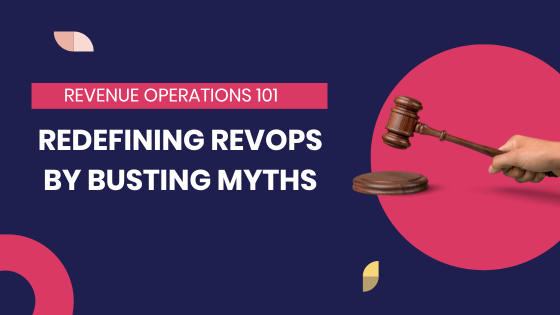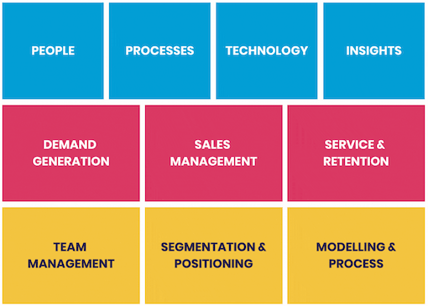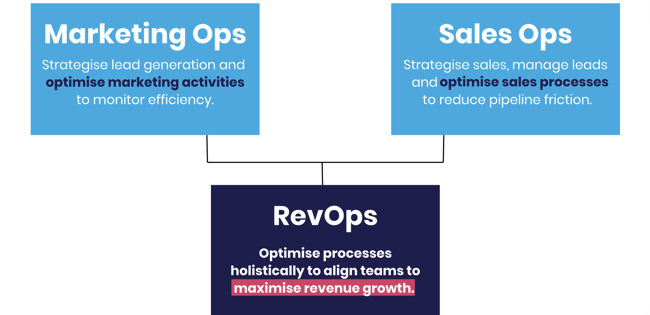


Revenue Operations 101: Redefining RevOps by Busting Myths




Revenue operations aka RevOps has become quite the buzzword in recent years, and rightly so considering the impact it has on driving revenue growth and improving customer experience.
As fame often comes with its share of rumours, RevOps is no exception.
RevOps has its fair share of misconceptions and myths surrounding its true essence.
In this blog, we'll be debunking RevOps myths in an effort to redefine its essential meaning and explain what is revenue operations.
What is Revenue Operations?

So, you know how most businesses are setup, each department operates independently under its own boss - sales reports to the Head of Sales, marketing to the Head of Marketing, and so on? Well, Revenue Operations, or RevOps, throws that old model out the window.
It's this clever strategy that brings marketing, sales, and customer success teams together, working under one roof.
But it's not just about physical proximity; it's about blending technology, processes, and strategy to create this seamless revenue-generating machine.
You see, the challenge with the old way of doing things is that everyone's chasing different goals, using different tools, and, for the most part, it sort of works, but not optimally. RevOps breaks down those barriers, encouraging collaboration, improving visibility, and making sure nothing falls through the gaps in the customer lifecycle.
Here's a quick crash course on RevOps before we dive in further:
Importance of Redefining Revenue Operations
It's interesting how RevOps has become this buzzword, but there are so many misconceptions floating around about what is revenue operations.
While bringing all the teams together covers a substantial chunk of what RevOps is about, that’s not the entirety of it.
RevOps is so much more than that, it’s a strategic alignment of optimising processes and technology to improve people to help remove silos and bring everyone together with the goal of driving revenue.
With all the buzz surrounding RevOps, it's easy to miss its true essence which makes it important to redefine RevOps and embrace its power to drive revenue growth.
RevOps Common Myths and Misconceptions
#1: RevOps is a new strategy
As per Ebsta’s guide, LinkedIn saw a surge of 300% in RevOps-related roles along with a 57% increase in companies adopting RevOps strategies or dedicating teams to it. This clearly shows the popularity RevOps gained in the past decade.
But that doesn’t mean it’s a new concept, RevOps has been around since always - evolving as a strategy for years in many businesses, slowly gaining momentum and getting its due credit.
Existing under the shadows, RevOps was being used by businesses to optimise and drive revenue growth the past few years before it became a buzzword, and now it’s become a competitive advantage overall.
#2: RevOps is the same as marketing strategy/ sales ops
RevOps is often descended to be described as just a marketing strategy or sales ops - and while marketing and sales are two very important elements of RevOps, it’s far beyond that.
Let’s break it down, shall we?

Marketing ops is the driving force behind managing and optimising marketing processes to enhance performance and generate valuable leads. Its primary objective is to transform strategies into actionable plans that align with business goals. This involves overseeing various aspects such as campaign management, content development, and more. By incorporating data and analytics, marketing ops also keeps a close eye on performance metrics to fine-tune campaigns and maximise their effectiveness.
On the other hand, sales ops focuses on the activities within the organisation that ensure sales representatives have the necessary tools, technology, and training to effectively manage leads. Sales ops heavily relies on data to forecast revenue and pipeline, enabling sales teams to better plan for the future and optimise their processes when there is a discrepancy between projected and achieved revenue.
Now RevOps, is the umbrella that encompasses multiple departments including marketing and sales alignment. Focusing on people, processes, technology, and data - RevOps helps align all the departments across the business to foster cross-functional collaboration and to ensure all of them are on the same page - driving revenue growth.
#3: RevOps is just relevant for startups
While startups can benefit significantly from implementing RevOps, it is not exclusive to them. RevOps principles are scalable and adaptable, making them applicable to businesses of all sizes. Whether you're a startup or an established enterprise, the core idea of aligning your revenue-generating functions through marketing and sales alignments and cross-functional collaboration remains crucial for sustained growth.
#4: RevOps = tool management
RevOps is not merely about managing tools or implementing new technology. While technology is an integral part of the RevOps framework, it is essential to understand that RevOps is a strategic approach that focuses on optimising processes, fostering collaboration, and driving revenue growth. Tools are enablers, but the strategy goes beyond their implementation.
#5: It's all about data
While data plays a vital role in RevOps, it is not solely reserved for companies with massive datasets. RevOps emphasises the quality rather than the quantity of data. It's about leveraging actionable insights to make informed decisions, regardless of the company's size. Small and mid-sized enterprises can benefit just as much as larger corporations by adopting a data-driven approach.
Remember, data is just one of the pillars of RevOps!
#6: Investing in RevOps is an added expense.
Contrary to the misconception that RevOps is an added expense, it should be viewed as an investment in the organisation's long-term success. RevOps aims to optimise processes, improve efficiency, and drive revenue growth. Any company, regardless of its size, can benefit from this strategic approach, making it a worthwhile investment for sustainable business development.
#7: RevOps is a one-time process
RevOps is not a one-and-done initiative. It is an ongoing, iterative process that requires continuous evaluation, adaptation, and improvement. The market, customer needs, and business landscapes evolve, and so should your RevOps strategy. Regularly revisiting and refining your approach ensures sustained success and growth.
The flywheel never stops!








